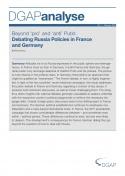Summary
Attitudes vis-à-vis Russia expressed in the public sphere are heterogeneous, in France more so than in Germany. In both France and Germany, the general public is by and large skeptical of Vladimir Putin and his policies. The picture is more diverse in the political realm. In Germany, there (still) is an approach that might be qualified as “mainstream.” The French debate, in turn, is highly fragmented.
In light of the two countries’ recent electoral campaigns, this study addresses the public debate in France and Germany regarding a number of key issues. It presents both dominant discourses, as well as those challenging them. The study thus offers insights into national debates generally unavailable to readers unfamiliar with the respective country’s political playgrounds or without the necessary language skills.
Overall, foreign-policy discourses seem to be drifting apart in France and Germany. The German political establishment continues to emphasize multilateralism and a rules-based international order. In France, the 2017 presidential campaign has shown considerable differences between – and sometimes even within – political parties. These differences continue to exist, and are even likely to deepen. This development’s consequences for Franco-German dialog thus go beyond the question of how to deal with Russia.

